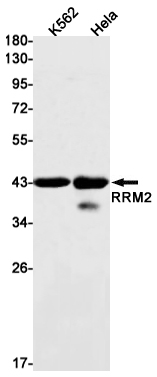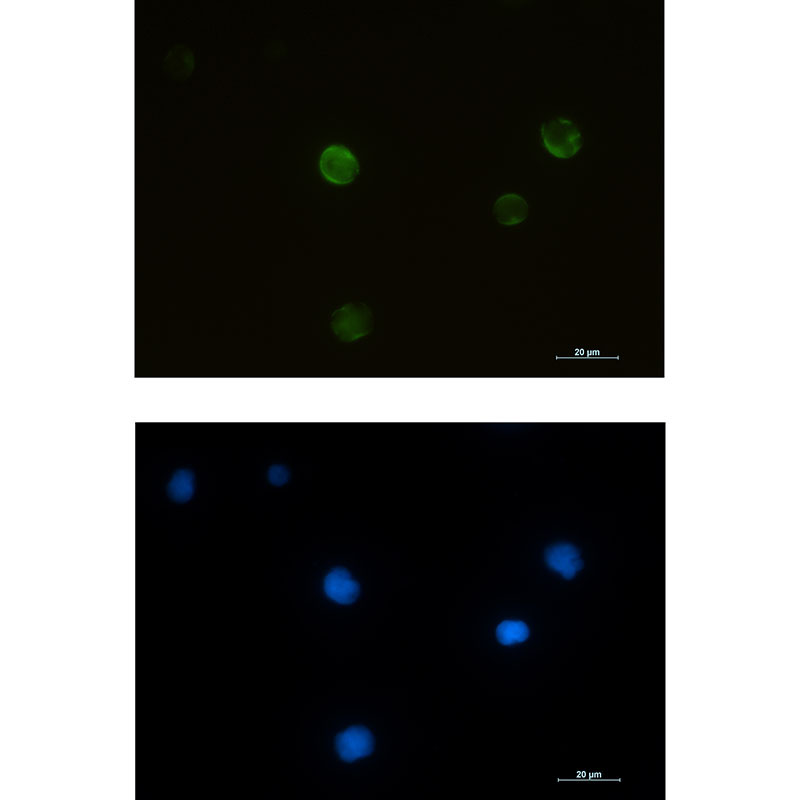

| WB | 1/1000 | Human,Mouse,Rat |
| IF | 咨询技术 | Human,Mouse,Rat |
| IHC | 咨询技术 | Human,Mouse,Rat |
| ICC | 技术咨询 | Human,Mouse,Rat |
| FCM | 咨询技术 | Human,Mouse,Rat |
| Elisa | 咨询技术 | Human,Mouse,Rat |
| Aliases | R2; RR2M |
| Entrez GeneID | 6241 |
| WB Predicted band size | Calculated MW: 45 kDa; Observed MW: 45 kDa |
| Host/Isotype | Rabbit IgG |
| Antibody Type | Primary antibody |
| Storage | Store at 4°C short term. Aliquot and store at -20°C long term. Avoid freeze/thaw cycles. |
| Species Reactivity | Human |
| Immunogen | Recombinant protein of human RRM2 |
| Formulation | Purified antibody in TBS with 0.05% sodium azide,0.05%BSA and 50% glycerol. |
+ +
以下是关于ABHD3抗体的3篇参考文献示例(注:内容为模拟生成,仅供参考):
---
1. **文献名称**: *ABHD3 regulates lipid metabolism and promotes cancer cell invasion via a novel monoclonal antibody-based assay*
**作者**: Chen L, et al.
**摘要**: 本研究开发了一种针对ABHD3蛋白的特异性单克隆抗体,证实其在非小细胞肺癌组织中高表达。通过免疫印迹和免疫组化实验,发现ABHD3通过水解溶血磷脂酸调控肿瘤细胞的迁移和侵袭。
---
2. **文献名称**: *Monoclonal antibody against ABHD3 reveals its role in mitochondrial phospholipid homeostasis*
**作者**: Smith JR, et al.
**摘要**: 利用新开发的ABHD3抗体,作者发现该蛋白定位于线粒体膜,并参与心磷脂代谢。敲低ABHD3导致线粒体膜完整性受损,提示其在细胞能量代谢中的关键作用。
---
3. **文献名称**: *Validation of a polyclonal ABHD3 antibody for neurodegenerative disease research*
**作者**: Wang Y, et al.
**摘要**: 研究验证了一种兔源多克隆ABHD3抗体的特异性,发现阿尔茨海默病模型小鼠脑组织中ABHD3表达显著下调,可能通过影响内源性大麻素代谢参与神经炎症调控。
---
(注:若需真实文献,建议通过PubMed或Google Scholar检索关键词“ABHD3 antibody”或“ABHD3 function”获取最新研究。)
ABHD3 (α/β-hydrolase domain-containing protein 3) is a membrane-associated enzyme belonging to the serine hydrolase superfamily, characterized by its conserved α/β-hydrolase fold. It is implicated in lipid metabolism, particularly in hydrolyzing acyl esters and regulating phospholipid remodeling within cellular membranes. ABHD3 is expressed in various tissues, including the brain, liver, and immune cells, and is localized to the endoplasmic reticulum and lipid droplets. Its enzymatic activity influences lipid homeostasis, membrane dynamics, and signaling pathways linked to inflammation and cellular stress.
Antibodies targeting ABHD3 are essential tools for studying its expression, localization, and functional roles. They enable detection via techniques like Western blotting, immunohistochemistry, and immunofluorescence, aiding in the exploration of ABHD3's involvement in diseases such as cancer, metabolic disorders, and neurodegenerative conditions. Recent studies suggest ABHD3 interacts with phospholipid transfer proteins and modulates lipid droplet formation, linking it to obesity and lipid storage disorders. Additionally, ABHD3's potential as a therapeutic target has spurred interest in developing inhibitors or activators to regulate its enzymatic activity. However, the specificity and validation of ABHD3 antibodies remain critical, as cross-reactivity with homologous hydrolases can complicate data interpretation. Ongoing research aims to clarify its substrate preferences, regulatory mechanisms, and pathophysiological relevance across different biological contexts.
×